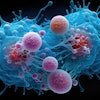In a case report published in the Journal of Clinical Oncology, community clinicians found that a woman diagnosed with advanced terminal lung cancer had, in fact, early-stage curable lung cancer, with lung lesions caused by a rare side effect from an antibiotic.
Clinicians from the University of Colorado Cancer Center surgically removed the patient's lung tumor and stopped the antibiotic, nitrofurantoin. She recovered and may now be cured, said Dr. Ross Camidge, director of the thoracic oncology clinical program and senior author of the study (J Clin Oncol, May 5, 2014).
The patient was a former smoker whose scans revealed a mass in her right lung, with multiple smaller nodules and infiltrates throughout both lungs. The biggest mass was biopsied and showed non-small cell lung cancer, and because the disease appeared throughout both lungs, she appeared to have advanced-stage or metastatic cancer.
However, Dr. Nicole Restauri, the radiologist reviewing the scans, alerted Camidge that about one in 100,000 women who take nitrofurantoin experience unusual side effects, including liver and lung damage. Camidge stopped the antibiotic and repeated the scans and blood tests a few weeks later.
The patient's liver tests returned to normal and everything except the known lung cancer disappeared from her scans; the team changed her diagnosis from incurable metastatic lung cancer to early-stage curable lung cancer. She is now in long-term follow-up care with no evidence of cancer recurrence to date, according to Camidge and colleagues.




















